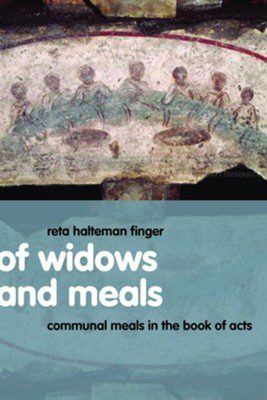The research for the revision and expansion of The Untold Story of the New Testament Church has been daunting. My study/writing studio is full of books by scholars and historians, and I’m notating everything I’m finding for the book’s documentation.
Prayers would be appreciated as this work has been daunting. And I often feel overwhelmed, especially since I’m not a fast reader.
Also, please don’t get the old version of the book. The new version of The Untold Story is going to be so far better in every respect.
We expect it to release in 2024, God willing. I have to turn the manuscript into the publisher at the end of December of this year (2022).
Of Widows and Meals: Communal Meals in the Book of Acts by Reta Halteman Finger is part of my research for the revision. This is a book that’s highly impressive.
This book is a detailed, yet readable, examination of the meals and meal practices throughout the book of Acts and in the first-century church.
The book covers the waterfront on the subject, including the social location of the meals.
If you are interested in this topic, this is the book you want.
I expect to add some of it in the documentation for The Untold Story.
Here’s a description from the publisher:
In the church at Jerusalem, women prepared and served communal meals. Finger contends that this tradition of an agape meal—which entails sharing with the poor—lasted for hundreds of years. If true, it has far-reaching implications for how the contemporary church should interact with the world. 320 pages, softcover. Eerdmans.
Though “community” has become a common byword in the contemporary Western church, the practice of communal sharing has effectively fallen by the wayside. Unfortunately, it is often the poor who are left wanting because we no longer come together.
Reta Halteman Finger finds a solution to this modern problem by learning from the ancient Mediterranean Christian culture of community. In the earliest Jerusalem church, in holding the responsibility for preparing and serving communal meals, women were given a place of honor. With the table fellowship and goods sharing of the early church, Luke says, “there were no needy persons among them” (Acts 4:34). Finger thoroughly examines this agape-meal tradition, challenging traditional interpretations of the “community of goods” in the Jerusalem church and proving that the communal sharing lasted for hundreds of years longer than previously assumed. Of Widows and Meals begins a discussion of need in community that can revolutionize the contemporary church’s interaction with the world at large.
Robert Jewett
— University of Heidelberg
“Of Widows and Meals is a first — the only comprehensive analysis and unbiased interpretation that I have seen of the references to koinonia in Acts 2 and 6. Reta Halteman Finger surveys everything written about this issue and shows that the Jerusalem church was sharing resources of its members to support daily communal meals, and that the widows played a decisive role in this ministry. A brilliant, provocative, and courageous study, with revolutionary implications for the contemporary church.”
Rosemary Radford Ruether
— Claremont Graduate University
“With impeccably detailed scholarship, Reta Finger examines the traditions in the book of Acts about shared property and daily meals in the early Jerusalem church. She shows that this tradition represented a real commitment to a new community in Christ that cut across class divisions and extended food and support to the poorest. For Finger, those traditions are not just a historical footnote on a curious and short-lived practice at the beginning of Christianity, but are an ongoing legacy that must be taken seriously as central to living out the Christian gospel today.”
William Tabbernee
— Phillips Theological Seminary
“Written by the foremost feminist New Testament scholar from the Mennonite-Anabaptist tradition, Of Widows and Meals demonstrates, once and for all, the historical actuality of sharing common meals and other possessions in the earliest Christian communities. Finger masterfully utilizes a multidisciplinary approach, drawing on the results of the most recent scholarship pertaining to meals in the ancient world. . . She clarifies that the widows mentioned in Acts 6 were not the poor recipients of ‘handouts’ but important members of the Christian community in Jerusalem who, themselves, had a significant role in the production of the daily meals for that community. This well-written and fascinating book, full of carefully nuanced corrections to earlier inadequate theories, is a treasure trove of enlightening new insights.”













